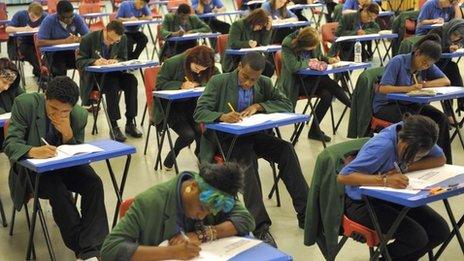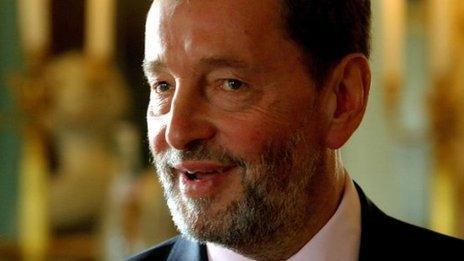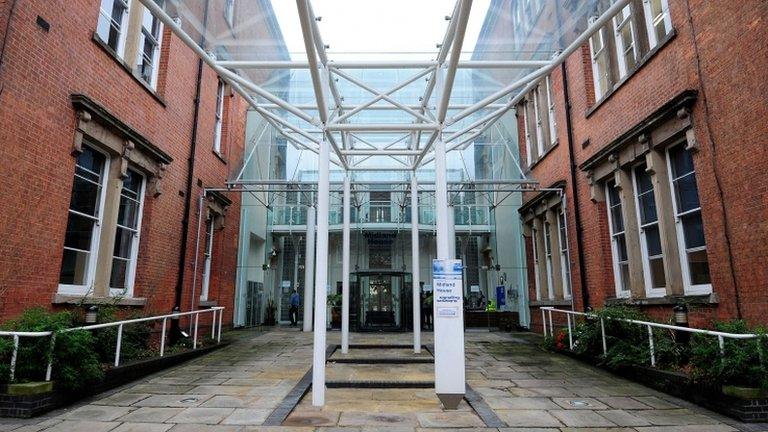Labour wants a new tier of 'school standards tsars'
- Published
- comments

The plans propose a new tier for supervising all types of state schools
Labour is calling for a more "coherent" way of running the different types of state-funded schools in England, including academies and free schools.
Former education secretary David Blunkett has published a report calling for all state schools to be co-ordinated under local control.
He proposes local "Directors of School Standards" to monitor schools.
Shadow education secretary Tristram Hunt said they would provide "robust local oversight of all schools".
The government argues that free schools and academies are already held more rigorously to account than council-run schools - and it is in the process of introducing regional school commissioners to monitor academies' performance.
This blueprint from Labour sets out a structure for how different categories of state schools, with separate forms of accountability, should be co-ordinated in local areas.
David Blunkett: More local control "would not lower academies' freedom"
Academies and free schools, which currently operate outside council education services, would be monitored by these local directors, who could intervene if there were problems with underperformance.
Academies, which have autonomy over staffing and the curriculum, are now the majority of secondary schools.
Under Labour's plans they would become accountable to these new directors and would not return to local authority control.
Council schools would also be under the scrutiny of these local "standards tsars", with one in each local authority area.
Extra places
Planning for extra places and creating new schools would also be the responsibility of these directors of school standards, who would be appointed by councils from a list of candidates approved by the education secretary.

David Blunkett says the current system of accountability is "undemocratic"
Labour says that this would provide a more consistent form of oversight - and would be more effective in identifying problems with academies and free schools.
It highlights concerns over the E-Act academy chain and the Al-Madinah free school.
Mr Blunkett's report said it was "unsustainable" and "undemocratic" to have thousands of individual schools "contractually bound to the secretary of state and free-floating from the communities they serve".
"All publicly funded schools should be held to the highest standard - without fear or favour," said Mr Blunkett, who was Tony Blair's first education secretary.
'Fragile' schools
"New local directors of school standards will monitor, support and challenge schools to improve, driving up standards in underperforming and 'fragile' schools - irrespective of the status of school. This has to be an agenda of high standards and fairness for all."
Labour's education spokesman, Tristram Hunt, welcomed that this report drew on the lessons of the London Challenge programme, which aimed to support struggling schools and improve results in schools in the capital.
"Spreading this success means an end to Michael Gove's 'sink or swim' schools policy, with new and robust local oversight of all schools to root-out underperformance. That's what directors of school standards will bring," said Mr Hunt.
The review has been welcomed by the National Association of Head Teachers, saying that it "responds sensibly to the emerging challenges of a fragmented, even balkanised education system".
The NASUWT teachers' union supported the challenge to the current system, which it said "weakened democratic accountability and handed more power to remote education providers at the expense of parents and local communities".
While Jonathan Simons, head of education at the Policy Exchange think tank said it "sounded the death knell for local authorities' role in schools. The decision to expand the role of local school commissioners and take almost all education powers from councils is a welcome move".
A Department for Education spokesman said: "We have consistently demonstrated quick and decisive action if children are being denied the education they deserve, no matter what type of school they attend.
"We moved to close Discovery New School just seven months after its inadequate Ofsted rating, while Al Madinah is already seeing real improvements thanks to our swift intervention.
"In contrast, local authorities have presided over schools which have been in special measures year on year and done nothing. There are currently 40 council-run schools that have been in special measures for 18 months or longer.
"Since its inception, the academies programme has freed schools from interference by politicians and bureaucrats and put teachers back in the driving seat."
- Published30 April 2014
- Published28 April 2014

- Published25 March 2014

- Published25 February 2014
